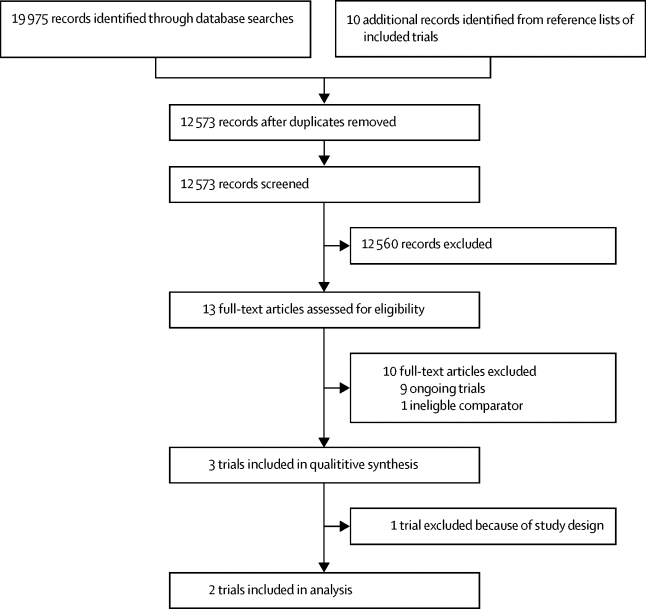Our official English website, www.x-mol.net, welcomes your
feedback! (Note: you will need to create a separate account there.)
Effect of treatment delay on the effectiveness and safety of antifibrinolytics in acute severe haemorrhage: a meta-analysis of individual patient-level data from 40 138 bleeding patients.
The Lancet ( IF 98.4 ) Pub Date : 2017-11-07 , DOI: 10.1016/s0140-6736(17)32455-8 Angèle Gayet-Ageron 1 , David Prieto-Merino 2 , Katharine Ker 3 , Haleema Shakur 3 , François-Xavier Ageron 4 , Ian Roberts 3 ,
The Lancet ( IF 98.4 ) Pub Date : 2017-11-07 , DOI: 10.1016/s0140-6736(17)32455-8 Angèle Gayet-Ageron 1 , David Prieto-Merino 2 , Katharine Ker 3 , Haleema Shakur 3 , François-Xavier Ageron 4 , Ian Roberts 3 ,
Affiliation

|
BACKGROUND
Antifibrinolytics reduce death from bleeding in trauma and post-partum haemorrhage. We examined the effect of treatment delay on the effectiveness of antifibrinolytics.
METHODS
We did an individual patient-level data meta-analysis of randomised trials done with more than 1000 patients that assessed antifibrinolytics in acute severe bleeding. We identified trials done between Jan 1, 1946, and April 7, 2017, from MEDLINE, Embase, the Cochrane Central Register of Controlled Trials (CENTRAL), Web of Science, PubMed, Popline, and the WHO International Clinical Trials Registry Platform. The primary measure of treatment benefit was absence of death from bleeding. We examined the effect of treatment delay on treatment effectiveness using logistic regression models. We investigated the effect of measurement error (misclassification) in sensitivity analyses. This study is registered with PROSPERO, number 42016052155.
FINDINGS
We obtained data for 40 138 patients from two randomised trials of tranexamic acid in acute severe bleeding (traumatic and post-partum haemorrhage). Overall, there were 3558 deaths, of which 1408 (40%) were from bleeding. Most (884 [63%] of 1408) bleeding deaths occurred within 12 h of onset. Deaths from post-partum haemorrhage peaked 2-3 h after childbirth. Tranexamic acid significantly increased overall survival from bleeding (odds ratio [OR] 1·20, 95% CI 1·08-1·33; p=0·001), with no heterogeneity by site of bleeding (interaction p=0·7243). Treatment delay reduced the treatment benefit (p<0·0001). Immediate treatment improved survival by more than 70% (OR 1·72, 95% CI 1·42-2·10; p<0·0001). Thereafter, the survival benefit decreased by 10% for every 15 min of treatment delay until 3 h, after which there was no benefit. There was no increase in vascular occlusive events with tranexamic acid, with no heterogeneity by site of bleeding (p=0·5956). Treatment delay did not modify the effect of tranexamic acid on vascular occlusive events.
INTERPRETATION
Death from bleeding occurs soon after onset and even a short delay in treatment reduces the benefit of tranexamic acid administration. Patients must be treated immediately. Further research is needed to deepen our understanding of the mechanism of action of tranexamic acid.
FUNDING
UK NIHR Health Technology Assessment programme, Pfizer, BUPA Foundation, and J P Moulton Charitable Foundation (CRASH-2 trial). London School of Hygiene & Tropical Medicine, Pfizer, UK Department of Health, Wellcome Trust, and Bill & Melinda Gates Foundation (WOMAN trial).
中文翻译:

延误治疗对急性严重出血中抗纤溶药物的有效性和安全性的影响:一项对来自40 138例出血患者的单个患者水平数据的荟萃分析。
背景技术抗纤维蛋白溶解剂减少了因外伤和产后出血引起的出血死亡。我们检查了治疗延迟对抗纤维蛋白溶解药疗效的影响。方法我们对1000多名评估抗纤溶药物治疗急性严重出血的患者进行的随机试验进行了个体患者水平的数据荟萃分析。我们从MEDLINE,Embase,Cochrane对照试验中央注册系统(CENTRAL),Web of Science,PubMed,Popline和WHO国际临床试验注册平台中确定了1946年1月1日至2017年4月7日之间进行的试验。治疗收益的主要指标是没有因出血而死亡。我们使用逻辑回归模型检查了治疗延迟对治疗效果的影响。我们调查了灵敏度分析中测量误差(错误分类)的影响。该研究已在PROSPERO注册,编号42016052155。结果我们从氨甲环酸的两项急性严重出血(创伤性和产后出血)随机试验中获得了40 138例患者的数据。总体而言,有3558例死亡,其中1408例(40%)是出血引起的。多数(1408人中的884 [63%])出血死亡发生在发病后的12小时内。产后出血的死亡在分娩后2-3小时达到高峰。氨甲环酸可显着提高出血总生存率(比值[OR] 1·20,95%CI 1·08-1·33; p = 0·001),且出血部位无异质性(相互作用p = 0·7243) )。治疗延迟降低了治疗获益(p <0·0001)。立即治疗可将生存率提高70%以上(OR 1·72,95%CI 1·42-2·10;p <0·0001)。此后,每延迟15分钟治疗直到3小时,生存获益减少10%,此后没有任何益处。氨甲环酸没有增加血管闭塞事件,并且出血部位没有异质性(p = 0·5956)。延迟治疗并未改变氨甲环酸对血管闭塞事件的影响。解释出血死于发病后不久,甚至短暂的治疗延迟也降低了氨甲环酸给药的益处。必须立即治疗患者。需要进一步的研究来加深我们对氨甲环酸作用机理的理解。英国NIHR健康技术评估计划,辉瑞,BUPA基金会和JP莫尔顿慈善基金会(CRASH-2试用)。辉瑞伦敦卫生与热带医学学院,
更新日期:2018-01-12
中文翻译:

延误治疗对急性严重出血中抗纤溶药物的有效性和安全性的影响:一项对来自40 138例出血患者的单个患者水平数据的荟萃分析。
背景技术抗纤维蛋白溶解剂减少了因外伤和产后出血引起的出血死亡。我们检查了治疗延迟对抗纤维蛋白溶解药疗效的影响。方法我们对1000多名评估抗纤溶药物治疗急性严重出血的患者进行的随机试验进行了个体患者水平的数据荟萃分析。我们从MEDLINE,Embase,Cochrane对照试验中央注册系统(CENTRAL),Web of Science,PubMed,Popline和WHO国际临床试验注册平台中确定了1946年1月1日至2017年4月7日之间进行的试验。治疗收益的主要指标是没有因出血而死亡。我们使用逻辑回归模型检查了治疗延迟对治疗效果的影响。我们调查了灵敏度分析中测量误差(错误分类)的影响。该研究已在PROSPERO注册,编号42016052155。结果我们从氨甲环酸的两项急性严重出血(创伤性和产后出血)随机试验中获得了40 138例患者的数据。总体而言,有3558例死亡,其中1408例(40%)是出血引起的。多数(1408人中的884 [63%])出血死亡发生在发病后的12小时内。产后出血的死亡在分娩后2-3小时达到高峰。氨甲环酸可显着提高出血总生存率(比值[OR] 1·20,95%CI 1·08-1·33; p = 0·001),且出血部位无异质性(相互作用p = 0·7243) )。治疗延迟降低了治疗获益(p <0·0001)。立即治疗可将生存率提高70%以上(OR 1·72,95%CI 1·42-2·10;p <0·0001)。此后,每延迟15分钟治疗直到3小时,生存获益减少10%,此后没有任何益处。氨甲环酸没有增加血管闭塞事件,并且出血部位没有异质性(p = 0·5956)。延迟治疗并未改变氨甲环酸对血管闭塞事件的影响。解释出血死于发病后不久,甚至短暂的治疗延迟也降低了氨甲环酸给药的益处。必须立即治疗患者。需要进一步的研究来加深我们对氨甲环酸作用机理的理解。英国NIHR健康技术评估计划,辉瑞,BUPA基金会和JP莫尔顿慈善基金会(CRASH-2试用)。辉瑞伦敦卫生与热带医学学院,











































 京公网安备 11010802027423号
京公网安备 11010802027423号